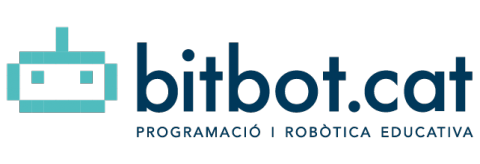The objective of the bitbot.cat program is to promote the improvement of the digital competence of young people and promote the growth of technological vocations.
The course coding and educational robotics is aimed at the workers of companies or organizations that train teachers or non-profit organizations that want to incorporate the extracurricular programs and robotics in their offer of activities.
It has a duration of 20 teaching hours that will be done in person at the Citilab in Cornellà and is evaluated with the preparation of a project with a planned dedication of 10 hours. Two editions will be made. The first will be held on October 17, 19, 24 and 26, from 9:00 a.m. to 2:00 p.m. The second will be on November 6, 8, 13, 20 and 27, from 3:30 p.m. to 7:30 p.m.
The registration period will end on Wednesday, 11 October at 12:00 a.m. It is a free course and registration will be done following the order of the applications.
The training is structured as follows (each day of training two sessions will be held):
Module 1: Introduction to programming (10h)
- Session 1: Basic concepts of programming: Computers, programming and robotics; Introduction to Scratch, visual programming for blogs; Share projects in the Scratch community. Practices: Move your character
- Session 2: Building simple games: Basic programming structures; Sequences, conditions and variables; Sending of messages. Practices: Pong game
- Session 3: Interactive stories and simulations: Preparation of interactive stories; Events, messages and status; Time management of history. Waits and messages. Construction of new blocks and clones. Practices: Make an interactive story
- Session 4: Data structures. Lists and functions. Practices: Visual and Hearing Memory Game (Simon)
Module 2: Robotics and maker world (10h)
- Session 1: Introduction to educational robotics: Automatisms, control systems, robots and educational robotics; Basic concepts of electronics and 3D design; Robotics platforms. Practice: Robots tracking lines
- Session 2: Sensors and actuators: Sensors, from the physical to the virtual world: potentiometers, analog and digital sensors; Actuators, modifying the physical world: LEDs, buzzers and motors. Practice: Virtual and real traffic light
- Session 3: Motion control: Type of motors and servos; sensors away. Practice: Car saves obstacles
- Session 4: App Inventor i bluetooth. Practice: Remote control of robots with the mobile.
Final project (10h)
- Prepare a didactic proposal in the field of the course.



